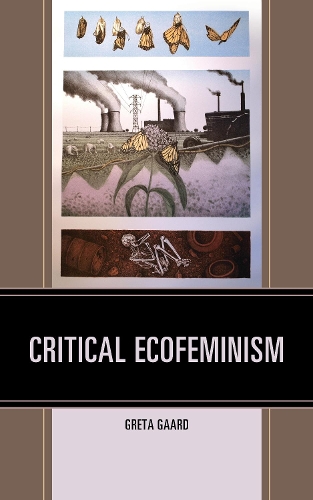
Critical Ecofeminism
(Hardback)
Publishing Details
Critical Ecofeminism
By (Author) Greta Gaard
Bloomsbury Publishing PLC
Lexington Books
16th June 2017
United States
Classifications
Professional and Scholarly
Non Fiction
The environment
304.2082
Physical Properties
Hardback
252
Width 159mm, Height 237mm, Spine 22mm
581g
Description
Australian feminist philosopher Val Plumwood coined the term critical ecofeminism to situate humans in ecological terms and non-humans in ethical terms, for the two tasks are interconnected, and cannot be addressed properly in isolation from each other. Variously using the terms critical ecological feminism, critical anti-dualist ecological feminism, and critical ecofeminism, Plumwoods work developed amid a range of perspectives describing feminist intersections with ecopolitical issuesi.e., toxic production and toxic wastes, indigenous sovereignty, global economic justice, species justice, colonialism and dominant masculinity. Well over a decade before the emergence of posthumanist theory and the new materialisms, Plumwoods critical ecofeminist framework articulates an implicit posthumanism and respect for the animacy of all earthothers, exposing the linkages among diverse forms of oppression, and providing a theoretical basis for further activist coalitions and interdisciplinary scholarship. Had Plumwood lived another ten years, she might have described her work as Anthropocene Ecofeminism, Critical Material Ecofeminism, Posthumanist Anticolonial Ecofeminismall of these inflections are present in her work. Here, Critical Ecofeminism advances upon Plumwoods intellectual, activist, and scholarly work by exploring its implications for a range of contemporary perspectives and issues--critical animal studies, plant studies, sustainability studies, environmental justice, climate change and climate justice, masculinities and sexualities. With the insights available through a critical ecofeminism, these diverse eco-justice perspectives become more robust.
Reviews
Critical Ecofeminism extends the discussion of ecofeminism, a field of study that connects ecology with feminism, which in turn connects paternalism and capitalism with the domination of women and nature. Adding critical to the equation makes a big difference between tying sociopolitical hegemonies and the current climate change crisis. It emphasizes reproduction as opposed to production, and adds the critical steps to sustainability. Gaard (English, Univ. of Wisconsin, River Falls)editor of Ecofeminism: Women, Animals, Nature (CH, Dec'93, 31-2177) and author of Ecological Politics: Ecofeminists and the Greens (CH, Nov'98, 36-1540)advances her argument in favor of a radical environmentalism that confronts, on all levels of culture, the meaning of a viable future for the Earth. Gaard mixes scholarly practice with creative writing and activism to extend the subject matter into many disciplines, including ecocomposition. She advocates a just ecofeminist sustainability for plants and animals and illustrates sociopolitical-economic factors present in the culture of milk, fireworks, and animals in space that need to change. She promotes climate justice, reevaluations of cli-fi (i.e., climate fiction) narratives, and queering the climate. The bibliography and references alone provide a map for future studies in technology, climatology, literary ecocriticism, and activism. Summing Up: Recommended. Upper-division undergraduates; faculty and researchers. * CHOICE *
This is a phenomenal book, beautifully written, powerfully argued, and supported by an extraordinary range and depth of theory and evidence. I have been profoundly moved by this work and have been reminded once again that Greta Gaard is one of the most important thinkers and activist-scholars of our time. -- David Naguib Pellow, University of California Santa Barbara, author of Total Liberation: The Power and Promise of Animal Rights and the Radical Earth Movement
An engaging and highly readable monograph by one of ecofeminisms most insightful scholars, Critical Ecofeminism is a stunning achievement. Gaard gives a reflective account of ecofeminisms evolution as an intersectional framework for interrogating socio-environmental relations and a politics of solidarity that demands eco-justice for all species. Her book provides welcome vindication for those who have remained convinced of ecofeminisms critical power despite thirty years of mischaracterization in most corners of the academy. -- Sherilyn MacGregor, The University of Manchester
Author Bio
Greta Gaard is professor of English and coordinator of the Sustainability Faculty Fellows at the University of Wisconsin-River Falls
